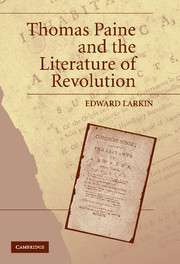Book contents
- Frontmatter
- Contents
- Acknowledgments
- Introduction
- 1 Inventing an American Public: The Pennsylvania Magazine and Revolutionary American Political Discourse
- 2 “Could the Wolf Bleat Like the Lamb”: Paine's Critique of the Early American Public Sphere
- 3 Writing Revolutionary History
- 4 The Science of Revolution: Technological Metaphors and Scientific Methodology in Rights of Man and The Age of Reason
- 5 “Strong Friends and Violent Enemies”: The Historical Construction of Thomas Paine through the Nineteenth Century
- Epilogue: Paine and Nineteenth-Century American Literary History
- Works Cited
- Index
Introduction
Published online by Cambridge University Press: 25 July 2009
- Frontmatter
- Contents
- Acknowledgments
- Introduction
- 1 Inventing an American Public: The Pennsylvania Magazine and Revolutionary American Political Discourse
- 2 “Could the Wolf Bleat Like the Lamb”: Paine's Critique of the Early American Public Sphere
- 3 Writing Revolutionary History
- 4 The Science of Revolution: Technological Metaphors and Scientific Methodology in Rights of Man and The Age of Reason
- 5 “Strong Friends and Violent Enemies”: The Historical Construction of Thomas Paine through the Nineteenth Century
- Epilogue: Paine and Nineteenth-Century American Literary History
- Works Cited
- Index
Summary
Forty-five years after the Revolution, in an 1821 letter to a friend, Thomas Jefferson commented on the remarkable literary skills of his old friend and sometime political ally, Thomas Paine: “No writer has exceeded Paine in ease and familiarity of style, in perspicuity of expression, happiness of elucidation, and in simple and unassuming language.” Since then, Jefferson's observation about the unique character of Paine's prose has been reiterated time and again by scholars of the Revolution. In his 1976 monograph Tom Paine and Revolutionary America, Eric Foner sums up this most durable critical consensus: “What made Paine unique was that he forged a new political language. He did not simply change the meanings of words, he created a literary style designed to bring his message to the widest possible audience” (xvi). Paine himself recognized the novelty of his approach to political writing. At the beginning of Rights of Man Part II, he explains why his immensely popular response to Edmund Burke's Reflections on the Revolution in France had appeared in two parts: “I wished to know the manner in which a work, written in a style of thinking and expression different to what had been customary in England, would be received before I ventured further.” With a style specifically designed to appeal to a wide popular audience, Paine moved away from the dominant tradition of classical rhetoric, which was an integral part of an older exclusionary political discourse, and toward a new psychology of persuasion that would define the newly emergent public sphere.
- Type
- Chapter
- Information
- Thomas Paine and the Literature of Revolution , pp. 1 - 21Publisher: Cambridge University PressPrint publication year: 2005



